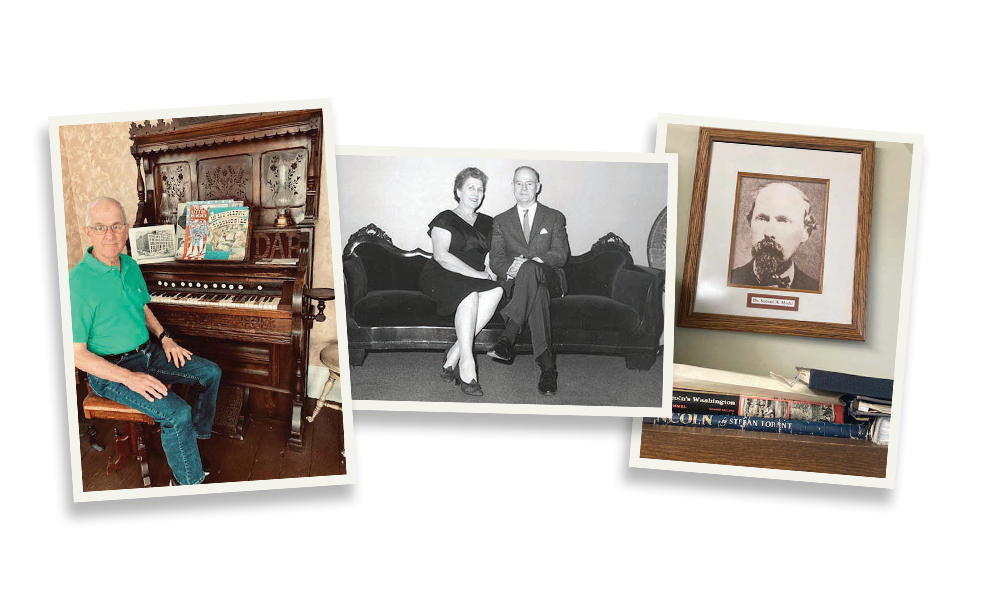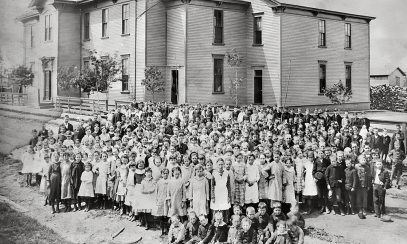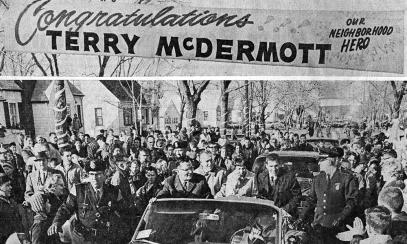
Catholic school grad and the Mudd family leave mark on national, state and local history
Tom Mudd has spent his life trying to clear his family’s name. Tom’s father, Dr. Richard Mudd, spent his lifetime doing the same.
Tom Mudd has spent his life trying to clear his family’s name. Tom’s father, Dr. Richard Mudd, spent his lifetime doing the same.
At the center of their efforts is Dr. Samuel A. Mudd.
“After all of my father’s exhaustive research, he was totally convinced of Dr. Samuel A. Mudd’s innocence,” said Tom, an historian and parishioner at the Cathedral of Mary of the Assumption.
Tom, too, is convinced. He believes his great-grandfather, Dr. Samuel A. Mudd, who set the broken leg of John Wilkes Booth after he assassinated President Abraham Lincoln in 1865, was unjustly found guilty of aiding and conspiring in the president’s murder.
“Our Saginaw home was a centerpiece for visitors who regularly stopped by to sit on the ‘Booth sofa,’” Tom said, referring to the sofa on which John Wilkes Booth sat while waiting to be treated by Dr. Mudd. “There were many books written and movies made about Dr. Samuel A. Mudd and the Lincoln assassination ... and there were always reporters hanging around our house.”
As such, Tom grew up entrenched in history. His father acquired thousands of books and papers during his lifetime of research into Civil War history, publishing several books about his grandfather’s innocence. After his passing in 2002, Tom inherited the responsibility and ongoing work of clearing the family name. He remembers his father saying to him, “Tom, your real work begins after I die.”
A St. Mary’s Cathedral High School grad and teacher by career, Tom began sorting through and donating the multitude of his father’s historically significant books, papers and files about President Lincoln, the Civil War and the Mudd family. He credits the Dominican Sisters at St. Mary’s in Saginaw for instilling in him discipline as well as excellent reading, writing and spelling skills. He began working his way through an entire basement of file cabinets at the historic Mudd family home in Saginaw.
Upon completion of this task, the donations Tom and the Mudd family made to local, state and national institutions are impressive:
- To Georgetown University’s Lauinger Library: Thousands of papers for the Richard D. Mudd Collection, dating from 1822-2002
- To the Dr. Samuel A. Mudd House and Museum in Charles County, Maryland: The “Booth sofa,” along with other artifacts
- To the State of Maryland Archives: Numerous boxes from the Mudd Collection
- To the State of Michigan Archives: Numerous boxes relating to Mudd family genealogy
- To Saginaw’s Hoyt Library Rare Book Collection: Over 800 volumes on President Lincoln, the Civil War and Dr. Samuel A. Mudd
Beyond the demanding work of curating the Mudd Collection, Tom has been instrumental in preserving not only the Mudd family history, but local and state history as well.
“Tom is God’s gift to Saginaw,” said Mike Slasinski, a 1958 graduate of Saginaw’s Holy Rosary High School and Saginaw Historical Society board member.
Tom helped preserve Saginaw’s Castle Museum, relocating the 1844 Cushway Home, organizing the Saginaw Old Golds vintage baseball team and inaugurating the historic Sign Park in Old Town Saginaw. His desire to generously give of his time also has extended to his faith community, and he helped establish the Cathedral District.
Senior priest and former Cathedral rector Father Tom McNamara appreciated the love of history Tom brought to the Cathedral of Mary of the Assumption.
“Tom Mudd has such great enthusiasm for all things Saginaw, Catholic and St. Mary’s, and other people catch his positive spirit,” said Father Tom. “One of the most beautiful features of our Cathedral are its stained-glass windows, and Tom provided our parish with a very interesting history of who donated each window.”
Tom candidly shares he was not the “stellar” student his sisters were. Three of Tom’s sisters— Johanna Vargas, Rose Marie Nickodemus and Stella Thelen— were all either valedictorian or salutatorian of their St. Mary’s classes. In fact, Tom often heard this comment from his teachers at St. Mary’s: “Tom, why aren’t you more like your sisters?”
“I broke the record for most demerits my sophomore year,” Tom said with a chuckle. “I skipped class and was, along with my good friend Ed, one of the two students Sister Agnes Clare asked the class to pray for during silent prayer and meditation.”
Yet, decades later, Tom looked up his old St. Mary’s Cathedral School teachers and made a special trip to their motherhouse in Grand Rapids to thank them for a great education.
“I had lunch with Sisters Yvonne, Kenneth and Agnes Clare,” Tom said. “And, despite the fact that one could hardly hear and one was partially blind, they all remembered Tom Mudd!
“We don’t often appreciate our teachers or our excellent Catholic school education until many years later, when it serves us so well in life.”
Anna Mae Maday, former manager of the Eddy Historical and Genealogical Collection at Hoyt Library and graduate of Holy Rosary High School in Saginaw, remembers Tom Mudd and his father, Dr. Richard Mudd, making frequent visits to the library to conduct research.
“We were all very interested in our schools, churches, neighborhoods and local history,” Anna Mae said. “Along with our families, we were involved in the research of local history and promoting it through books, articles and presentations at the Saginaw Humanities Series.”
Tom has a soft spot in his heart for his alma mater. He fondly remembers when he and his classmates sang “The Bells of Saint Mary’s” at their 1958 graduation. When his beloved wife Evelyn died in 2022, Tom donated the funds needed for a new clapper on the Cathedral’s bell, as well as security cameras for the church.
“When I hear those bells ring, I think of my great years at St. Mary’s– and of Evelyn as well,” Tom said.
Tom continues to deeply believe in a person’s right to a good name, including his great-grandfather, even though he admits it is now in the realm of public opinion.
“My great-grandfather Dr. Samuel A. Mudd was convicted and sent to an island prison in the Gulf of Mexico,” Tom said. “There he helped treat soldiers and prisoners who had yellow fever, saved many lives and was pardoned by President Andrew Johnson in 1869.”
Presidents Ronald Reagan and Jimmy Carter sent the Mudd family letters stating they believed Dr. Samuel A. Mudd was innocent, but it was not within their authority to clear his name. President Reagan even signed the letter himself, as he was “very interested” in the case, according to a White House staffer.
With his strong background in history and discipline instilled in him by a Catholic school education, Tom’s efforts have left a lasting impact on Saginaw and beyond.
“I was raised in a household where history was almost a daily issue. Of course, that issue was justice for Dr. Samuel A. Mudd,” he said. “That sparked my lifelong interest in history and historic preservation.”



